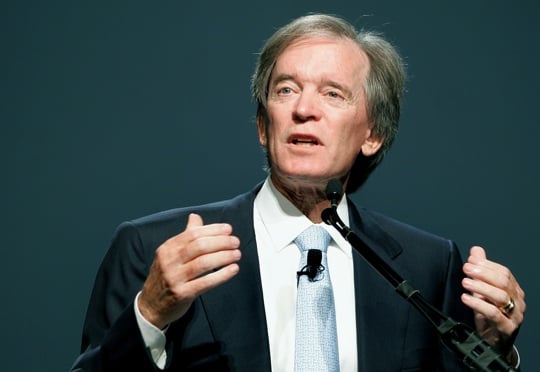Bill Gross sounded a warning on Thursday about the imminent return of inflation. This is not good news for clients sitting on a stack of long bonds.
Bll Gross is betting that central banks, including the U.S. Federal Reserve, will be successful in their efforts to ignite some inflation as they print money with the hope of generating economic growth.
“What I sense is a titanic battle of the ages, a battle between deflation and reflation,” the manager of the world’s largest bond fund said Thursday.
Mr. Gross, co-founder and co-chief investment officer of Pacific Investment Management Co. LLC, gives the reflation effort a 70% to 75% chance of succeeding, versus a 20% to 25% chance of deflation taking hold.
“So you should naturally tilt your portfolios to reflation,” he told an audience of about 400 advisers and ETF providers at the IndexUniverse Inside Fixed Income Conference in Newport Beach, Calif.
Even if central banks were to begin moving interest rates up, it wouldn’t trigger 1970s-style inflation of 12% or 13%, with gold tripling in value, Mr. Gross said.
“We’re not looking to that, but we see inflation moving to perhaps 3.5%,” he said.
That scenario “tilts you toward the equity side, I suppose,” Mr. Gross said. “Tilt toward [Treasury inflation-protected bonds], shorter-duration [bonds], tilt to developing countries, tilt to real assets. I’m not a gold bug … but if the Fed prints another trillion or two, they will have debased the currency relative to gold [or to] assets that can’t be produced at that rate.”
Mr. Gross addressed the question that he indicated was on everyone’s mind: How could the Pimco Total Return Exchange-Traded Fund, an ETF best known by its trading symbol BOND, do so much better than its broad-based bond benchmark?
“I ask myself that everyday,” he said, noting that the ETF has produced a 700 basis point return advantage over the Barclays U.S. Aggregate Bond Index over the past seven months.
“It’s an appreciation rate that can’t be continued,” he said. “The target is 100 to 200 basis points over [the index].”
So how has it happened? “Because we work like dogs,” Mr. Gross said. “I get in at 5:30 a.m. and follow BOND obsessively, every five minutes. It’s sort of ridiculous, but I really care.”
In addition, Mr. Gross said it was easier to manage “a fund that’s all cash flow” coming in. “It gives you an open range of choices.”
With $2.7 billion in assets now, though, “it’s a little harder. But it is still an achievable objective to beat the [bond] index funds,” Mr. Gross said.







